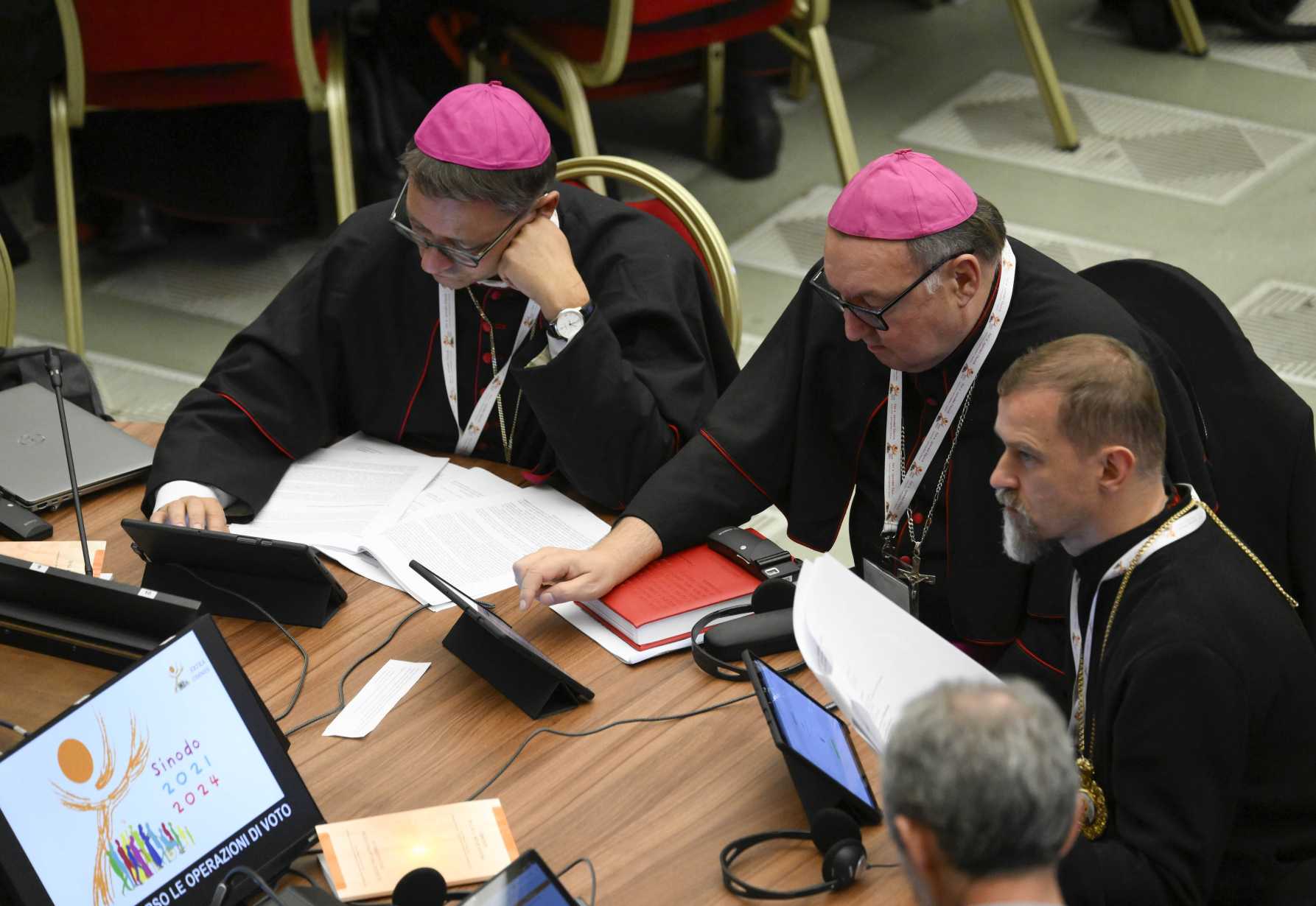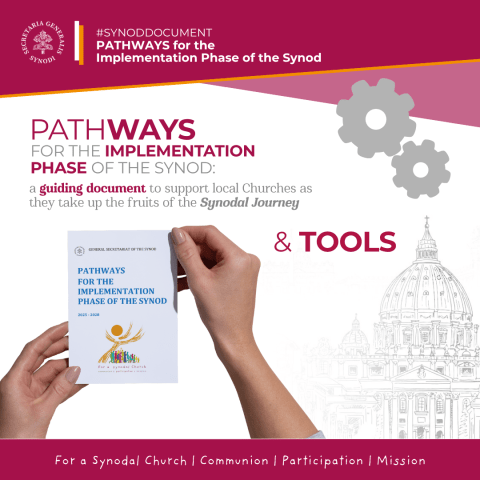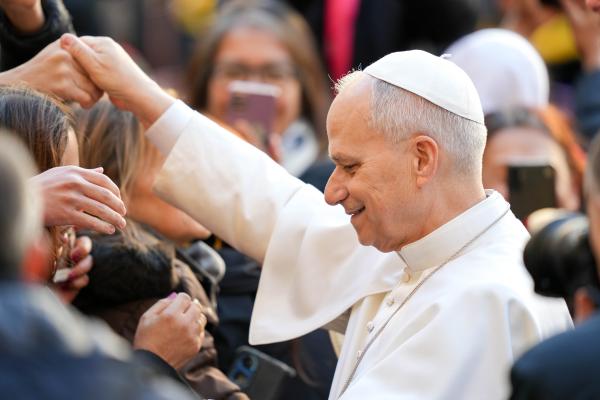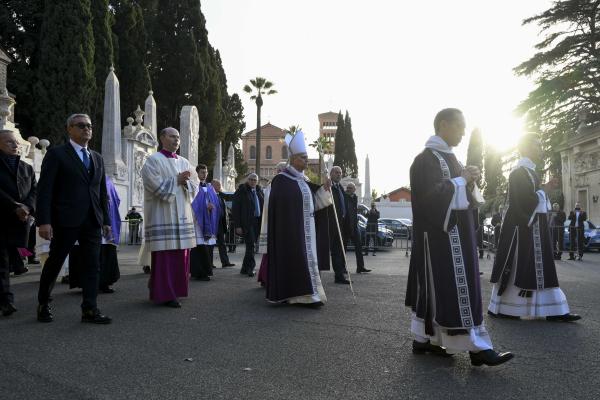Vatican provides guidelines to help local churches, bishops implement synod on synodality
The Vatican released a new set of guidelines to help bishops and parishes take the lead in implementing the proposals from the 2024 synod on synodality.
Local churches must play an active role in this phase, it said, including by reaching out to diverse communities such as the marginalized, young people and those resistant to the synodal process, because, "in order to truly walk together, we cannot lose the contribution of their point of view."
 Carol Glatz
Carol Glatz

Members of the assembly of the Synod of Bishops use tablets to vote on the gathering's synthesis document Oct. 28, 2023, in the Paul VI Hall at the Vatican. (CNS photo/Vatican Media)
VATICAN CITY (CNS) -- Local churches and bishops worldwide will be instrumental in helping implement the proposals and foster the spirit of the 2024 final document of the Synod of Bishops on synodality, the Vatican synod office said.
To more effectively carry out the mission of evangelization, the implementation phase of the synod "aims to examine new practices and structures that will make the life of the church more synodal," the General Secretariat of the Synod of Bishops said in a new set of guidelines released July 7.
"Concretely, the priority is to offer the people of God new opportunities to walk together and reflect on these experiences in order to reap their fruits for the mission and share them," the text said.

The 24-page text, titled "Pathways for the Implementation Phase of the Synod," is a guide for bishops and synodal teams, and an invitation to them to share their initiatives as they apply the synod on synodality's final proposals locally. It also seeks to answer some key questions the office received recently. The text was released in multiple languages at synod.va.
Divided into four chapters, the document offers responses to: What is the implementation phase and what are its objectives?; Who will participate in the implementation phase and what are their tasks and responsibilities?; How to engage with the 2024 synod assembly's final document during the implementation phase?; And what method and tools can help shape the implementation phase?
The guidelines underline how the local churches must play an active role in this phase, including by reaching out to diverse communities such as the marginalized, young people and those resistant to the synodal process, because, "in order to truly walk together, we cannot lose the contribution of their point of view."
Engagement should extend beyond the parish to include schools, hospitals, prisons and digital platforms, it said, and relations with religious communities, movements and associations should be strengthened to further exchange the variety of gifts toward mission.
Synodality "cannot be a path limited to a core group of 'supporters,'" it said.
"On the contrary, it is important that this new process contribute concretely 'to expand possibilities for participation and for the exercise of differentiated co-responsibility by all the baptized, men and women' in a spirit of reciprocity," it said. "Moreover, it is crucial that it aims to involve those who have so far remained on the margins of the ecclesial renewal process established by the synod."
The diocesan or eparchial bishop is the first person responsible for the implementation phase, the guidelines said. "It is his responsibility to initiate it, officially indicate its duration, methods and objectives, accompany its progress and conclude it, validating its results."
This phase "will be an appropriate opportunity to exercise authority in a synodal way," it said, reminding bishops they are not alone and should encourage all members of the church to share the journey together.
Synodal teams and participatory bodies "will be essential in the implementation phase as well," the guidelines said, so "existing teams should be valued and, where necessary, renewed; those that have been suspended should be reactivated and appropriately integrated; and new teams should be formed where they have not been established previously."
Every diocese or eparchy also needs to register its synodal team with the synod office by requesting a link to its database at synodus@synod.va to aid communication and effective coordination, it said.
The implementation phase of the synod was opened by Pope Francis in November 2024 when he called upon local churches, bishops' conferences and others to implement "the authoritative proposals contained in the document through the processes of discernment and decision-making provided for by law and by the document itself," the late pope wrote.
The three-year period of implementation and evaluation on the local, national, regional and international levels will culminate in a "celebration of the ecclesial assembly" in October 2028 at the Vatican "to share the fruits of the implementation phase and to have a kind of evaluation," Xavière Missionary Sister Nathalie Becquart, undersecretary of the Synod of Bishops, said.
"The best way to start the implementation phase is really to read the final document of the synod. That is the reference for this implementation phase," she said in an interview with Vatican News July 7.
The new guidelines then "are a kind of tool to help to dive into the final document of the synod and to take it up in a discerning way, to see how to implement it at the local level, also with this creativity that is coming from the Holy Spirit, because you can’t have just one way for everybody all over the world," she added.
The synod's final document "is the point of reference for the implementation phase," the guidelines said.
The mission of proclaiming the Kingdom of God "constitutes the backbone" and final goal of the synod's final document, the text said. "Reflections on the tools to be adopted or the reforms to be implemented should always be placed within the perspective of the mission."
The final document "firmly promotes a church that is increasingly courageous in its outreach," it said, and "it embraces the conciliar vision of a church in the world, in dialogue with everyone, with other religious traditions and with the entire community."
"Growing as a synodal church capable of dialogue has a prophetic value that includes a commitment to social justice and integral ecology. These dimensions cannot be neglected in the implementation phase, leading to the creation of opportunities for dialogue based on the concrete needs of the territories and societies in which we live," the text said.
Sister Becquart said the guidelines and the implementation phase are a prime opportunity for the "exchange of gifts" between the local churches, which is "a core notion of the final document, a core notion of a synodal church."
"We all have something to give and something to receive," she said. "This document is also really to highlight that you can't just do your synodal conversion alone, but it's very important to work together as different local churches."



